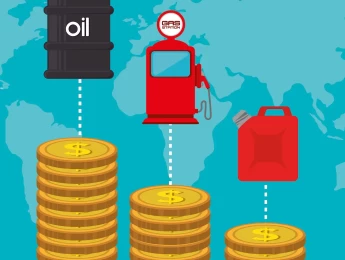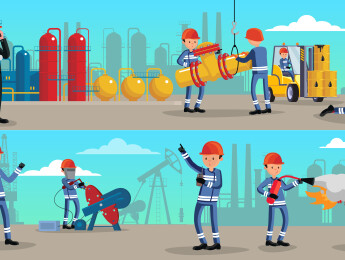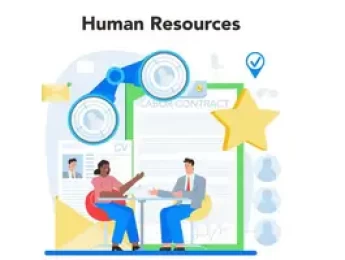The oil and gas sector has unique accounting needs. Exploration and development, production and sales, and the impacts of the energy market all influence how finance and accounting are tracked and measured.
This course targets non-finance professionals who want to understand the financial structures and implications that affect the oil and gas industry. You will examine accounting specific to exploration and production activities, assess costs associated with reserves, and evaluate risks and costing strategies for energy businesses. In addition, you will also explore financial reporting for the oil and gas sector.
Upon completion of this course, participants will be able to:
- Examine long-term strategic challenges specific to the oil and gas sector.
- Understand important financial accounting and reporting principles.
- Identify economic, financial, and commercial drivers.
- Convey effective and prompt information to key stakeholders.
- Enhance measurement, controls, and performance reporting
This course is intended for:
- Professionals in the oil and gas industry
- Board members and other stakeholders in the energy sector
- Anyone looking to understand the unique aspects of financial accounting for oil and gas
This course uses a variety of adult learning styles to aid full understanding and comprehension. Participants will review case studies to highlight key areas of importance and possible areas for faults. They will be supplied with the best tools required for learning exercises to improve their skills. Participants will analyse the examples to thoroughly understand how these skills, techniques and methods apply in the workplace.
Day 5 of each course is reserved for a Q&A session, which may occur off-site. For 10-day courses, this also applies to day 10
Section 1: Overview Of The Oil And Gas Sector
- Describe the role of Exploration and Production (E&P) in the oil and gas sector.
- Review the business environment of E&P.
- Examine risks, rewards, oil and gas field life cycles, and commercial arrangements.
- Outline the role of the finance professional in the oil and gas sector.
- Explore fundamentals of project economics, including project cash flows, cost of capital, time value of money (TVM), decision criteria, and project models.
Section 2: Accounting For Exploration And Development Costs
- Outline financial reporting frameworks for the oil and gas sector.
- Define key accounting principles, standards, and terms.
- Describe the essential components of an accounting system.
- Examine capital and operating expenditures.
- Explore costs associated with resource exploration and appraisal.
- Compare the full cost and successful efforts accounting methods.
- Discuss development costs, including commitments and tangible assets.
Section 3: Reserves, Production, And Sales Costs
- Define the three reserve categories: proved, probable, and possible.
- Examine the implications of reserve quantity disclosures.
- Discuss present challenges in accessing reserves.
- Identify production costs: lifting costs, maintenance costs, and royalties.
- Describe the Depreciation, Depletion, and Amortisation (DD&A) accounting method.
- Use the Unit of Production (UOP) method to calculate depletion.
- Outline the requirements and process for both ceiling and impairment tests.
- Explain the process of reporting on decommissioning liabilities and costs.
Section 4: Risk And Cost Sharing
- Describe the advantages and challenges of joint ventures.
- Examine the cash flow and reserve implications of production-sharing agreements.
- Discuss pricing structures and offtake agreements for long-term gas contracts.
- Outline interest or risk transfer strategies structure: farm out agreements and carried interests.
- Review statements for financial performance, cash flow, and position.
- Calculate and interpret ratio analysis results.
- Discuss the leverage ratios used to evaluate energy businesses.
Section 5: Reporting On Financial Analyses, Budgets, And Management
- Identify strategies to improve business needs and corporate governance.
- Discuss the energy market and its associated risks.
- Outline product life cycles and the basics of Earned Value Management (EVM) for the oil and gas sector.
- Describe how to develop, measure, and report KPIs.
- Analyse the main components of financial statements, including investment, budgets, profitability, liquidity, and solvency.
- Identify how to develop and manage risk registers, cost estimates, and contingency plans.
- Apply the Monte Carlo simulation to model probabilities.
- Develop financial and management reporting methods to support decision-making.
- Discuss contract development and management.
Upon successful completion of this training course, delegates will be awarded a Holistique Training Certificate of Completion. For those who attend and complete the online training course, a Holistique Training e-Certificate will be provided.
Holistique Training Certificates are accredited by the British Assessment Council (BAC) and The CPD Certification Service (CPD), and are certified under ISO 9001, ISO 21001, and ISO 29993 standards.
CPD credits for this course are granted by our Certificates and will be reflected on the Holistique Training Certificate of Completion. In accordance with the standards of The CPD Certification Service, one CPD credit is awarded per hour of course attendance. A maximum of 50 CPD credits can be claimed for any single course we currently offer.
- Course Code IND01-119
- Course Format Classroom, Online,
- Duration 5 days














